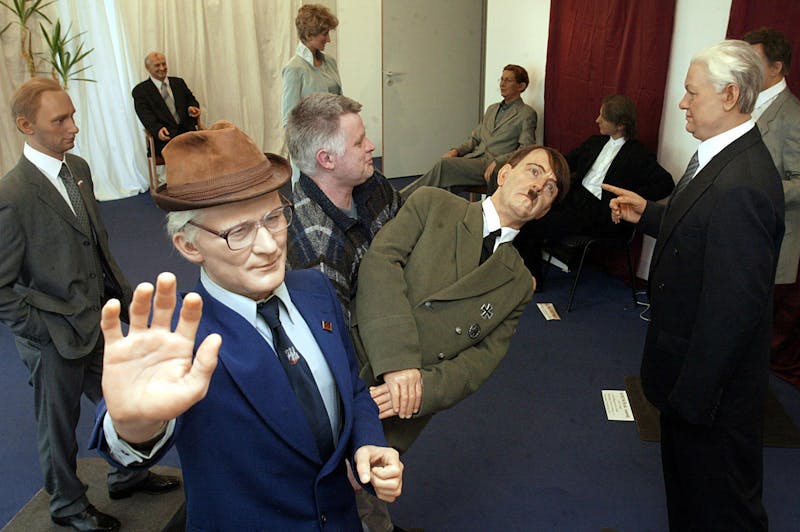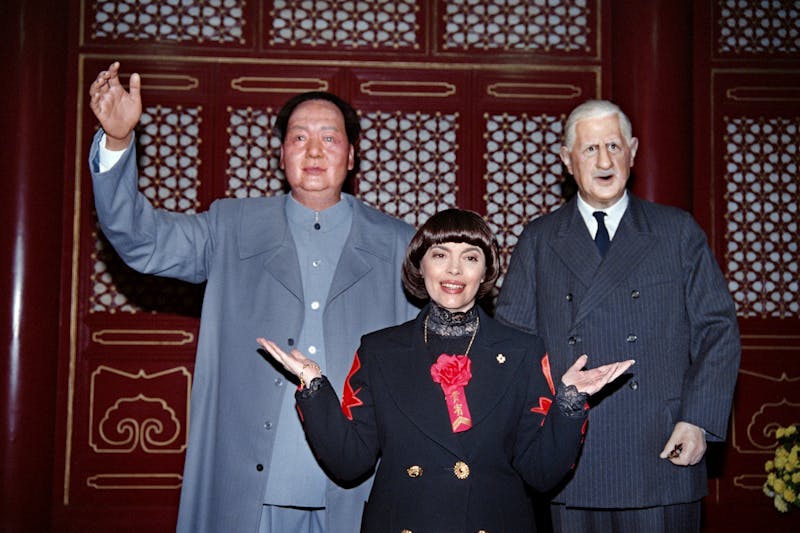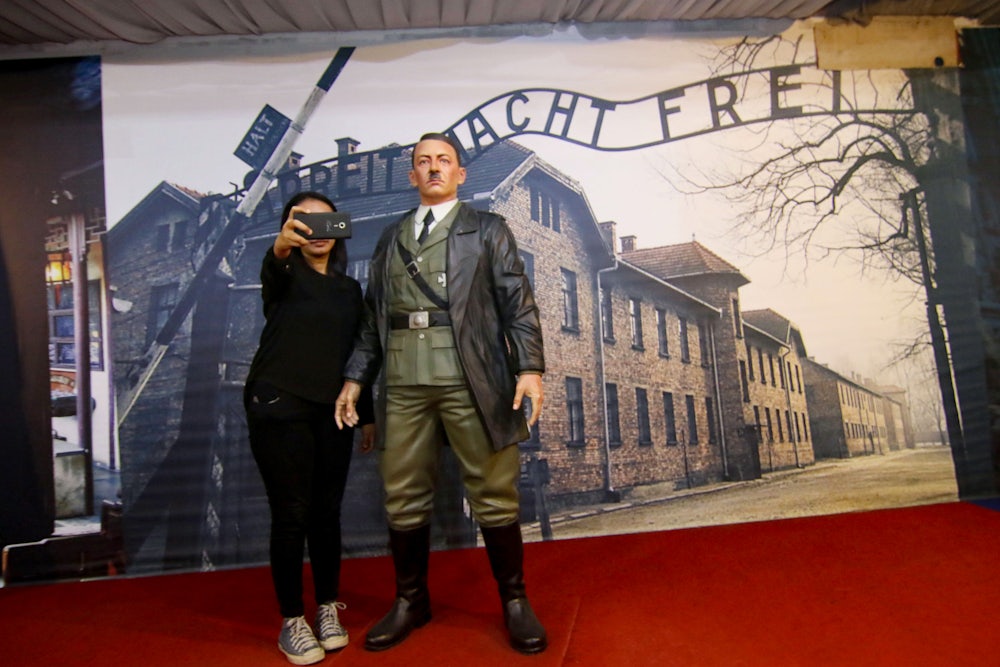This week, the internet laughed at a University of Chicago professor named Luigi Zingales. In a town hall with students, Zingales defended his decision to host a debate with Steve Bannon. An attendee asked if he would have invited Hitler to a debate. As The Chicago Sun-Times reported, Zingales replied, “I think I would distinguish early Hitler from later Hitler. I think it would have been very useful to know ahead of time what he was about.”
A reliable amplifier of internet gags, New York editor Max Read tweeted the story with the added comment that “hitler just wasn’t the same after the hacienda closed.” Not to kill the joke with explanation, but it’s funny because it shows how Zingales’s comment is both deranged and oddly familiar, as if the twentieth century’s most notorious mass murderer were some Madchester denizen. Even in context—the tiresome debate about no-platforming controversial speakers at universities—Zingales’s remark was surreal. Out of context it reads like a postcard from an alternate reality.
Casual references to twentieth century totalitarianism have been cropping up lately like clover in the lawn. Katie Roiphe’s Harper’s piece on Twitter feminism was peppered with references to Mao and to the “thought police.” She likened me to a secret policeman in a totalitarian state, because the tone of my writing is friendly but my arguments, apparently, threatening. (I had argued that it had become standard for people to gain consent before kissing each other.) What version of totalitarianism was she referring to? The line had a vague and messy relationship with reality, invoking a government with total power over its citizens to criticize a journalist she disagreed with.
One was writing in Harper’s and the other making impromptu comments in a town hall, but Roiphe and Zingales’s arguments chime with one another. They’re both talking about free speech. If we had just heard Hitler out we could have known what he was really about, seen what Churchill saw, Zingales says. If #MeToo feminists would just listen to people who disagree with them, Roiphe says, they might learn something. Free speech is the enemy of the total state, and Zingales and Roiphe are the enemies of the “censors.” So those who contest either their speech or their ability to amplify voices generally considered beyond the pale—Hitler!—might as well be working for Stalin.
Both arguments are specious, based on a clumsy syllogism. They’re born of carelessness and a lack of attention to history. But this carelessness is now part of the air we breathe. Americans’ relationship with the most horrendous episodes of the twentieth century has been thrown out of joint, with strange implications for politics.

The taboo on Nazism eroded during the 2016 election and the first year of Donald Trump’s presidency. Horrifyingly and consistently, neo-Nazis stepped into the public attention. At Charlottesville but also at many other demonstrations across the U.S., groups like Identity Evropa expressed views with explicit connections to Hitler, emboldened by the legitimacy lent to figures like Richard Spencer by the most powerful men in the country, including the occupant of the Oval Office. This trend reached its nadir when the president declared that “some very fine people” had marched in Charlottesville.
Those Nazi sympathizers and their elected representatives in Washington have reconfigured an important line in American cultural politics: the alignment between the right and a glorified national self-image that was produced in the aftermath of World War II. The strong identification between conservatives and the greatest generation and their fight for freedom had felt unshakable, lasting through the Cold War and the War on Terror. But conservatism has changed, infected to the top by white supremacy and other hateful ideologies that Americans were so proud to have defeated on the battlefield, even if they allowed uniquely American versions of them to fester at home.
Meanwhile, the commentariat also reached back into the twentieth century to try to explain the phenomenon of Trump’s presidency—with mixed results. In March last year, The New Republic’s Jeet Heer analyzed the historian Timothy Snyder’s arguments about Trump’s parallels with Hitler in his book On Tyranny. At the core of the book, Heer wrote, lies a “tendency to lump together many disparate historical phenomena ... as Snyder strains to apply the term ‘tyranny’ to a huge variety of political problems.” Snyder compared Hitler and Stalin’s tyranny to American society’s tyranny “over slaves and women, for example,” despite the fact that these were radically different types of “tyranny in action,” as Heer put it.
The sea change in the way that Americans talk about the past has facilitated this new carelessness. Our political conversations are unmoored from the history of totalitarian regimes in the twentieth century: factually, ideologically, and in the field of empathy with the dead.
This has repercussions for America’s sense of itself. In a book published last year on the refugee crisis, the former British Foreign Minister David Miliband argued that the modern idea of the West is a post-War ideological formulation. In describing Roosevelt and Churchill’s 1941 Atlantic Charter, he cited the German minister Joschka Fischer, who called it the “birth certificate for the West.” That document set out goals for allied states, with a special focus on human rights. Crucially, it was tethered by the war that had just occurred. The “high ideals that some Western leaders brought into global debate,” as Miliband put it, were defined by the absolute opposition to all that Nazism represented. In Germany, the source of the wound, Hitler’s Mein Kampf was banned, as were the Nazi Party and its insignia.
The drift of American political discourse—at the street level and at the presidential—from the ideals of the Atlantic Charter has had a number of consequences. The chief one is an ambient feeling of the surreal, of the world turned upside down—the element that makes Zingales’s line about Hitler’s early work seem so funny. It must be especially surreal for every conservative who identified their country with those veterans who fought in the name of those ideals. When your country feels suddenly unfamiliar, it is hard to know how to have political conversations or where to look for representation.

The free and easy way in which a writer like Katie Roiphe throws out references to secret police is linked to the general confusion surrounding the twentieth century. She approvingly cited a source who called the new feminism “Maoist,” without explaining how. She calls the “feminist tweets ... recognizably Trumpian.” She compared writers to the “secret police,” of which the most famous are the Gestapo and the Stasi.
In framing a group of feminists as metaphorical instruments of a totalitarian state, Roiphe and other #MeToo critics suggest that dissent—which is really what the new wave of feminist activism against workplace abuse is, since most of the people she names are young workers—is oppression. When a person with a prominent voice suggests that they are being victimized for their beliefs, they are engaging in a kind of politics that refuses conversation. It is not all that different from the rhetoric of white grievance that Trump perpetuates, and that has led otherwise mainstream conservatives to increasingly ally with fringe elements solely to irritate liberals.
People on the left have been careless with history too. American socialists have a tricky job when they reclaim the writings of Marx and friends from history. The political theory of socialism and communism are not the same as the material histories they accompanied. But maybe because many American leftists have little personal connection to the various regimes of the twentieth century—in Russia and the USSR, in China, in Cambodia, in Ethiopia, and many other places—Twitter leftists sometimes feel entitled to joke about Maoism or toy with the iconography of the USSR without much thought to the people, alive and dead, who lost their lives and their family to the violent police forces, famines, and purges of the twentieth century.
I don’t want to be the pompous joke police any more than I want to come across like a “low-level secret policeman in a new totalitarian state,” as Roiphe put it. But across the political spectrum, we need to pay more attention to the way that we dredge the previous century for metaphors and anecdotes. The American valorization of the men and women who conquered Hitler and preserved the West’s freedom was always flawed and inflected by the ideological convenience of the post-War decades, which were characterized by a different flavor of white supremacy and social conservatism. But the memory of Hitler, Stalin, Mao, and others does not belong solely to those who love the armed forces over everybody else. It belongs to the victims of their regimes and to every generation who inherited the world that they scarred. We owe it to ourselves—our peers and those we disagree with alike—to treat history with care.
